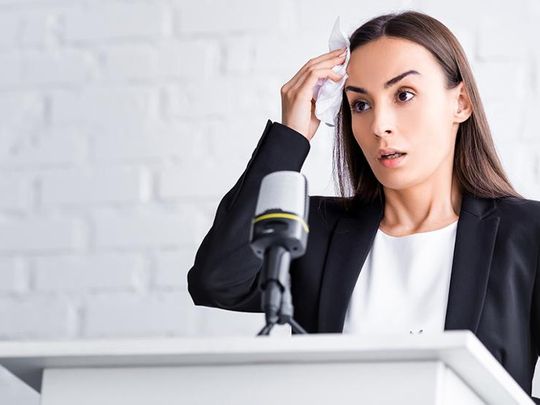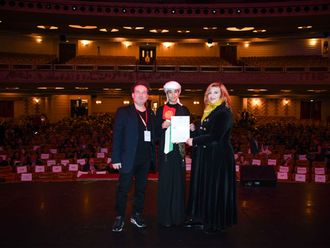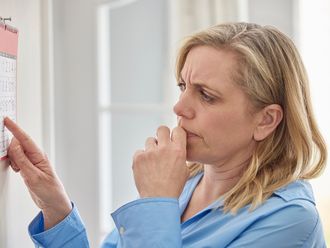
I wonder if anyone actually likes the sound of their own voice. Town criers, perhaps. Toby Young. The rest of us have, at least at some point in our lives, likely been a member of what I call the sweaty-hands club: those who would sell their first born if it got us out of a presentation, or have palpitations at the mere thought of getting up on stage.
A study by Chapman University in 2014 found that one in four people admit to being frightened of speaking in public. I don't know when my fear of public speaking started, but I can't remember a time when I didn't have it. Fear comes from the unknown, they say, and for years I had no experience of talking in front of more than a small group of people.
Like most state schools in the 90s, mine in Grantham, Lincolnshire provided few chances to practise public speaking. The extent of it was a debating club, which from the outside appeared to consist of three girls in blazers glued to cue cards from WH Smith. But then, even if a teacher had offered me one-on-one training with the world's greatest orator, I would likely have feigned a stomach ache to get out of it. It wasn't that I was painfully shy – I was creative enough to write good lines, and stubborn enough to get any presentation done – but I could think of few things worse than getting up in front of a room of my peers and delivering a speech.
This continued for the next decade, through my undergraduate degree, PhD and first forays into journalism. If I had considered my fear of public speaking as part of the awkwardness of adolescence, I didn't seem to be growing out of it.
As the years went on, I found two things determined how nervous I got: the scale of the event and who was in the audience. A school careers talk to a crowd of teenagers I could blag with confidence, but ask me to deliver a presentation to a small room of academics and I would want to vomit.
Imposter syndrome is both a cliche and a frustrating reality. My sister and I were the first generation in our family to do a degree and I fell in at the deep end by opting for a Russell Group university, and sticking around for a doctorate. I loved the experience but was surrounded by the voices of private school alumni, and without similar tools to get my own words out. It wasn't that their thoughts were necessarily better, but that they had the confidence to believe it was worth hearing. It didn't help that public speaking isn't typically designed with wheelchair-users like me in mind. When you can't reach the PowerPoint controls or see over the lectern, you can feel all the more self-conscious.
What changed for me was taking a punt on a part-time job: teaching first-year undergraduates political theory. I saw it as a way to be out of my comfort zone, but not so far away that it would be overwhelming. It turned out to be a surreal and invigorating experience, where I had to be a ringleader and critical thinker, a lecturer and babysitter, handling anything from political analysis to an exploding yogurt pot (don't ask).
Teaching is far from a traditional public-speaking gig (for one, it involves far more listening by the speaker), but it helped give me the tools to get up in front of any crowd: thinking on my feet, the ability to engage a room, understanding your audience, and above all, confidence in my own voice. (If you can get a hungover 18-year-old vaguely interested in Aristotle, you realise your powers of persuasion are borderline hypnotic.)
There was never a transformative event that turned things around, no lightning bolt of newfound confidence. But sat in front of a class for the umpteenth week, listening to myself hold their attention, I realised (whisper it) I was actually pretty good at this.
Within a couple of years, I had gone into political journalism full-time and made the leap to taking on broadcast and event work. I felt panic before my debut on live TV – I recall it mainly involved being locked in a Travelodge toilet in Bath at 5am wondering how I had got myself into this – but once I had done it, I felt elated. And each new experience built my speaking confidence, allowing me to agree to more things. I found methods that helped, such as detailed planning (ignore anyone who says speeches fail without spontaneity), practising at home beforehand, and getting used to the rhythm of my voice. Since then, I've done regular live TV and radio, spoken in front of crowds of 800 people, and recorded an audiobook.
It isn't that my nerves have gone away, but I no longer see myself as someone unable to do it. What I have learnt is that it is a myth that there are natural public speakers – and that some of us are destined for TED Talks and others to quiver in the corner. Whether it's through posting Instagram Stories or agreeing to that work presentation, there are ever-increasing ways to get used to talking publicly. There is a public speaker in all of us. Even those in the sweaty-hands club.
Guardian News & Media
Read more
- The great unknown: Tips to dealing with uncertainty
- An online quiz reveals some discomforting results about the decline of our intelligence
- The jobs that will be in high demand in an unchartered future
- In the wild world of coronavirus, it pays to be mindful











